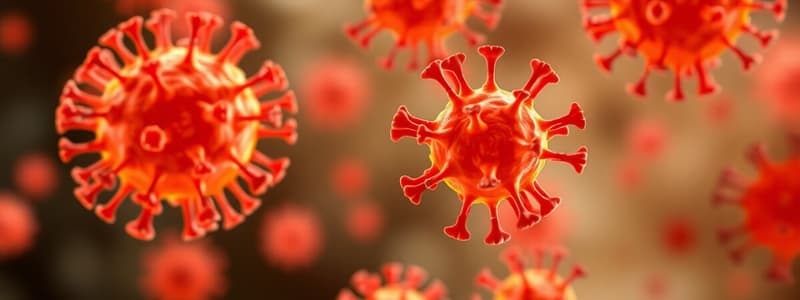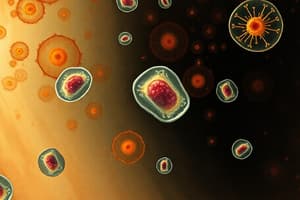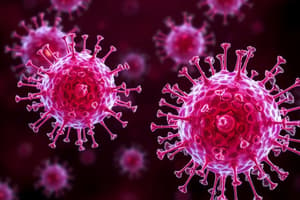Podcast
Questions and Answers
What initiates the adaptive immune response in the body?
What initiates the adaptive immune response in the body?
- The activation of B lymphocytes
- The insufficient response of the innate immune system (correct)
- The production of antibodies by T lymphocytes
- The presence of cytokines
Which type of immunity is specifically associated with the production of antibodies?
Which type of immunity is specifically associated with the production of antibodies?
- Innate immunity
- Specific immunity
- Humoral immunity (correct)
- Cell-mediated immunity
What is the primary function of memory cells in the adaptive immune system?
What is the primary function of memory cells in the adaptive immune system?
- To prepare the body for future encounters with the same antigen (correct)
- To phagocytize invading pathogens
- To produce antibodies against all pathogens
- To initiate inflammation during infection
Which of the following cells are primarily responsible for cell-mediated immunity?
Which of the following cells are primarily responsible for cell-mediated immunity?
How does adaptive immunity differ from innate immunity in terms of response time?
How does adaptive immunity differ from innate immunity in terms of response time?
Which type of immune response primarily involves activated macrophages and cytotoxic T-lymphocytes?
Which type of immune response primarily involves activated macrophages and cytotoxic T-lymphocytes?
What role do antigen presenting cells (APCs) play in the adaptive immune response?
What role do antigen presenting cells (APCs) play in the adaptive immune response?
What defines the longer-lasting nature of adaptive immunity compared to other forms of immunity?
What defines the longer-lasting nature of adaptive immunity compared to other forms of immunity?
Adaptive immunity is always immediate and does not require prior exposure to an antigen.
Adaptive immunity is always immediate and does not require prior exposure to an antigen.
Humoral immunity is primarily mediated by T lymphocytes.
Humoral immunity is primarily mediated by T lymphocytes.
Cell-mediated immunity involves the action of both B cells and antibodies.
Cell-mediated immunity involves the action of both B cells and antibodies.
Memory cells enhance the primary immune response by promoting a quicker and more robust reaction upon subsequent exposure to the same antigen.
Memory cells enhance the primary immune response by promoting a quicker and more robust reaction upon subsequent exposure to the same antigen.
The adaptive immune response includes the innate immune system as its primary function.
The adaptive immune response includes the innate immune system as its primary function.
Antigen presenting cells (APCs) are crucial for the activation of lymphocytes in adaptive immunity.
Antigen presenting cells (APCs) are crucial for the activation of lymphocytes in adaptive immunity.
The humoral immune response is faster than the cell-mediated immune response.
The humoral immune response is faster than the cell-mediated immune response.
The adaptive immune system only responds to viral infections and has no role in bacterial infections.
The adaptive immune system only responds to viral infections and has no role in bacterial infections.
Explain the specific differences in response times between humoral and cell-mediated immunity.
Explain the specific differences in response times between humoral and cell-mediated immunity.
Describe how memory cells contribute to long-term immunity following the first exposure to an antigen.
Describe how memory cells contribute to long-term immunity following the first exposure to an antigen.
What roles do T lymphocytes play in the adaptive immune response, specifically regarding their functions?
What roles do T lymphocytes play in the adaptive immune response, specifically regarding their functions?
How do antigen presenting cells (APCs) facilitate the activation of lymphocytes during the adaptive immune response?
How do antigen presenting cells (APCs) facilitate the activation of lymphocytes during the adaptive immune response?
Elaborate on the importance of the innate immune system in activating adaptive immunity.
Elaborate on the importance of the innate immune system in activating adaptive immunity.
Discuss the significance of B lymphocytes in the humoral immune response.
Discuss the significance of B lymphocytes in the humoral immune response.
What is the overall characteristic of adaptive immunity that differentiates it from innate immunity?
What is the overall characteristic of adaptive immunity that differentiates it from innate immunity?
Identify the primary activation signals of T lymphocytes during the adaptive immune response.
Identify the primary activation signals of T lymphocytes during the adaptive immune response.
Adaptive immunity is also known as ______ immunity.
Adaptive immunity is also known as ______ immunity.
The primary cells responsible for humoral immunity are ______ cells.
The primary cells responsible for humoral immunity are ______ cells.
The ______ immune response is carried out by T cells.
The ______ immune response is carried out by T cells.
Memory cells provide ______ to fight pathogens when they are encountered again.
Memory cells provide ______ to fight pathogens when they are encountered again.
Antigen presenting cells (APCs) process invading pathogens and present portions to ______ in peripheral lymphoid tissue.
Antigen presenting cells (APCs) process invading pathogens and present portions to ______ in peripheral lymphoid tissue.
Humoral immunity involves the production of ______ molecules in response to an antigen.
Humoral immunity involves the production of ______ molecules in response to an antigen.
Adaptive immunity is slower, more specific, and ______ lasting compared to innate immunity.
Adaptive immunity is slower, more specific, and ______ lasting compared to innate immunity.
The ______ immune response is primarily mediated by B lymphocytes.
The ______ immune response is primarily mediated by B lymphocytes.
Match the following components of the adaptive immune system with their primary functions:
Match the following components of the adaptive immune system with their primary functions:
Match the following types of immune responses with their characteristics:
Match the following types of immune responses with their characteristics:
Match the following aspects of adaptive immunity with their descriptions:
Match the following aspects of adaptive immunity with their descriptions:
Match the following cells with their types of immunity they are primarily associated with:
Match the following cells with their types of immunity they are primarily associated with:
Match the following immune responses with their activating cells:
Match the following immune responses with their activating cells:
Match the following terms related to adaptive immunity with their correct definitions:
Match the following terms related to adaptive immunity with their correct definitions:
Match the following statements about adaptive immunity with their correct responses:
Match the following statements about adaptive immunity with their correct responses:
Match the following features of adaptive immunity with their implications:
Match the following features of adaptive immunity with their implications:
Flashcards are hidden until you start studying
Study Notes
Adaptive Immunity
- Adaptive immunity is triggered when the innate immune system fails to control an infection.
- Two major types of adaptive responses exist:
- Cell-mediated immune response carried out by T cells
- Humoral immune response controlled by B cells and antibodies
- Adaptive immunity is considered the third line of defense, following surface barriers and innate immunity.
- Compared to inflammation, it is:
- Slower, more specific, and longer-lasting.
- Acquired after contact with antigens, thus also called acquired immunity.
- The adaptive response is typically initiated by cells of the innate immune system, primarily phagocytes.
- Adaptive immunity recognizes specific antigens.
- It provides memory to fight pathogens when they are encountered again.
- Key components of adaptive immunity:
- Antigen-presenting cells (APCs), like macrophages, process invading pathogens.
- APCs present portions of engulfed pathogens to lymphocytes in peripheral lymphoid tissue.
- Lymphocytes mediate the adaptive immune response.
- B lymphocytes are responsible for humoral immunity.
- T lymphocytes are responsible for cell-mediated immunity.
Humoral Immunity
- Humoral immunity involves antibody production in response to an antigen and is mediated by B lymphocytes.
- It is also known as antibody-mediated immunity.
Cell-Mediated Immunity
- Cell-mediated immunity (CMI) involves the production of cytotoxic T lymphocytes, activated macrophages, activated NK cells, and cytokines in response to an antigen.
- This response is mediated by T lymphocytes.
- It's also termed cell-mediated immunity, focusing on the actions of specific T lymphocytes.
Memory Cells
- Memory cells play a crucial role in preparing the body for future encounters with the same antigen.
- They recognize the antigen and respond with a secondary immune response.
- Secondary immune responses are characterized by:
- Faster cycles of division, leading to a shorter response time.
- Greater amplitude, with a whole clone of cells contributing to a higher antibody (Ab) production compared to the primary response.
- Memory cells are the foundation of long-lasting immunity associated with infections like measles and whooping cough.
Adaptive Immunity
- Adaptive immunity develops after exposure to an antigen, which could be from a pathogen or vaccination.
- It's activated when the innate immune response is insufficient to control an infection.
- Two types of adaptive responses: cell-mediated and humoral.
- Cell-mediated immunity is carried out by T cells.
- Humoral immunity is controlled by activated B cells and antibodies.
- Adaptive immunity is considered the third line of defense, after surface barriers and innate immunity.
- Adaptive immunity is slower, more specific, and longer lasting than inflammation.
- It's acquired after contact with antigens, thus also known as acquired immunity.
- Adaptive response is usually initiated by innate immune system cells, mainly phagocytes.
Components of Adaptive Immunity
- Antigen-presenting cells (APCs) process invading pathogens.
- APCs, like macrophages, present portions of engulfed pathogens to lymphocytes in peripheral lymphoid tissue.
- Lymphocytes mediate the adaptive immune response.
Types of Lymphocytes
- B lymphocytes: Responsible for humoral immunity
- T lymphocytes: Responsible for cell-mediated immunity
Humoral Immunity
- Involves antibody production in response to an antigen.
- Mediated by B lymphocytes.
- Also called antibody-mediated immunity due to its reliance on antibody activity.
Cell-Mediated Immunity
- Involves production of cytotoxic T lymphocytes, activated macrophages, activated NK cells, and cytokines in response to an antigen.
- Mediated by T lymphocytes.
- Also called cell-mediated immunity due to its reliance on actions of specific T lymphocytes.
Memory Cells
- Play a crucial role in preparing the body for future encounters with the same antigen.
- Memory cells recognize antigens and respond through a secondary immune response, which:
- Is faster, with rapid division cycles.
- Is greater in amplitude, producing a larger clone of cells and higher antibody levels compared to the primary response.
- Memory cells are the foundation for lifelong immunity associated with certain infections like measles and whooping cough.
Adaptive Immunity
- Adaptive immunity is a specific immune response that develops after exposure to an antigen.
- It is the third line of defense, activated when innate immunity is insufficient.
- Adaptive immunity is slower, more specific, and longer lasting than inflammation.
- Adaptive immunity recognizes specific antigens and provides memory for future encounters.
Adaptive Immune Response
- Two main types of adaptive response:
- Cell-mediated immunity: mediated by T cells
- Humoral immunity: mediated by B cells and antibodies
Components of Adaptive Immunity
- Antigen-presenting cells (APCs) process invading pathogens and present them to lymphocytes.
- Examples of APCs: macrophages, dendritic cells
- Lymphocytes are the primary cells responsible for adaptive immune response.
- B lymphocytes are responsible for humoral immunity.
- T lymphocytes are responsible for cell-mediated immunity.
Humoral Immunity
- Involves the production of antibodies in response to an antigen.
- Antibody-mediated immunity is another name for humoral immunity.
- Mediated by B cells.
Cell-Mediated Immunity
- Involves the production of cytotoxic T lymphocytes, activated macrophages, activated NK cells, and cytokines in response to an antigen.
- Cell-mediated immunity is another name for cell-mediated immunity.
- Mediated by T cells.
Memory Cells
- Memory cells are generated during an initial exposure to an antigen.
- They recognize the antigen upon subsequent encounters and trigger a faster and stronger secondary immune response.
- Memory cells form the basis of long-lasting immunity to specific infections like measles and whooping cough.
Adaptive Immunity
- Adaptive immunity occurs after exposure to an antigen from a pathogen or vaccination.
- The adaptive immune response is activated when the innate immune response fails to control an infection.
- The adaptive immune system provides a third line of defense after barrier defenses and innate immunity.
- Adaptive immunity is slower, more specific, and longer lasting than inflammation.
- It is acquired after contact with antigens (thus also called acquired immunity).
- Adaptive immune responses are typically initiated by cells of the innate immune system, primarily phagocytes.
- The adaptive immune system recognizes specific antigens.
- It provides memory to fight pathogens upon re-exposure.
Components of Adaptive Immunity
- Antigen-presenting cells (APCs), like macrophages, process invading pathogens.
- APCs present portions of engulfed pathogens to lymphocytes in peripheral lymphoid tissues.
- Lymphocytes, primarily B and T cells, mediate the adaptive immune response.
- B lymphocytes are responsible for humoral immunity.
- T lymphocytes are responsible for cell-mediated immunity.
Humoral Immunity
- Humoral immunity involves antibody production in response to an antigen, mediated by B lymphocytes.
- It is also called antibody-mediated immunity due to its reliance on antibody activity.
Cell-Mediated Immunity
- Cell-mediated immunity involves the production of cytotoxic T lymphocytes, activated macrophages, activated NK cells, and cytokines in response to an antigen, mediated by T lymphocytes.
- It is also called cell-mediated immunity based on the action of specific T lymphocytes.
Memory Cells
- Memory cells prepare the body for further contact with the same antigen.
- They recognize the antigen and respond with a secondary immune response.
- The secondary response is faster (shorter division cycles) and greater in amplitude (more cells and higher antibody levels) than the primary response.
- Memory cells contribute to life-long immunity associated with infections like measles and whooping cough.
Adaptive Immunity
- Adaptive immunity, also known as acquired immunity, is an immunity developed after exposure to an antigen, either from a pathogen or a vaccination.
- It is the third line of defense after surface barriers and innate immunity.
- Adaptive immunity is slower but more specific and lasting, unlike the inflammation reaction.
- Adaptive immunity is activated when the innate immune response is insufficient to control an infection.
- It recognizes specific antigens and develops memory to combat the same pathogens in the future.
- It's initiated by cells of the innate immune system, primarily phagocytes.
- It relies on lymphocytes—B lymphocytes for humoral immunity and T lymphocytes for cell-mediated immunity.
Humoral Immunity
- Humoral immunity involves the production of antibodies in response to an antigen.
- It is mediated by B-lymphocytes and is also known as antibody-mediated immunity.
Cell-Mediated Immunity
- Cell-mediated immunity involves the production of cytotoxic T-lymphocytes, activated macrophages, activated NK cells, and cytokines in response to an antigen.
- It is mediated by T-lymphocytes and is also known as cell-mediated immunity.
Memory Cells
- Memory cells prepare the body for future encounters with the same antigen.
- They recognize the antigen and respond with a secondary immune response, which is faster, greater in amplitude, and more efficient due to a larger clone of cells, compared to the primary response.
- They are the basis of lifelong immunity for certain infections like measles and whooping cough.
Studying That Suits You
Use AI to generate personalized quizzes and flashcards to suit your learning preferences.




